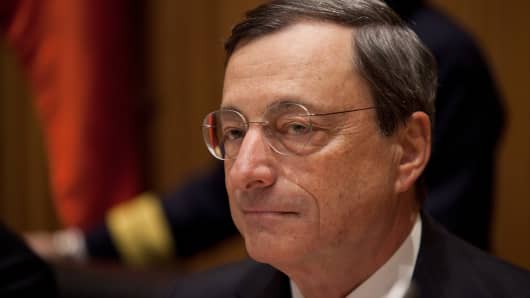The yield Tuesday was elevated, but it's much lower—at 4.82 percent, up 25 basis points from Monday. Italy will face a major test Wednesday when it plans to auction 6.5 billion euros in 5- and 10-year bonds.
Yardeni says by avoiding financial contagion, Draghi also stopped the bond vigilantes from knocking some sense into the Italians—and the Spaniards—who Yardeni says are now slip-sliding away from dealing realistically with their problems.
So, the Italians, as a result, find themselves in a political vacuum, says Adrian Miller of GMP.
At last count, this week's Italian election has resulted in a hung parliament as the Bersani led Democratic Party coalition was able to eke out a slim victory in the lower house (Chambers of Deputies) of parliament affording the group an election premium and 55 percent of the 600 seats.
But the problem is with the upper house (Senate), where no coalition party was able to win a majority. Since both houses have equal law-making powers, the lack of a clear majority by one party in both houses leaves the decision making process in limbo unless a coalition forms. (Read More: Italy's Stalemate Could Mean Chaos for Euro Zone)
The uncertainty puts euro zone funding costs at risk, Miller says. Even before the results were known, Italy's auction of 8.75 billion euros of six-month bills Tuesday saw the highest yield since October, at 1.237 percent. That compares to January's six-month bill auction yield of 0.731 percent. (Read More: Euro Rally: Was It Just Too Good to Be True?)
Miller said the auction of longer dated securities Wednesday will be telling, and a 5 percent or higher 10-year yield would be a very important, and negative psychological threshold.





